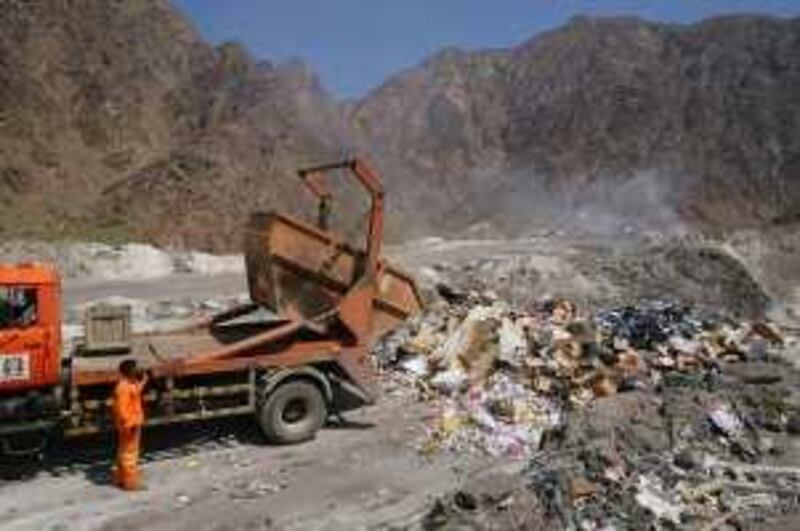ABU DHABI // Waste disposal in some northern emirates is a health hazard because it is not being done properly, according to a member of the Federal National Council. Hamad al Madfaa said that waste was being burned, and even when it was buried it was not always disposed of correctly.
The FNC member from Sharjah said some methods of disposal failed to meet environmental standards and called for a nationwide system to be introduced. "They do the gathering but they do not do processing, only land filling," Mr al Madfaa said at a meeting of the FNC this month. "Land filling does not comply with proper standards. It lacks regulations and settings of standards and measures. "Some of the emirates burn the waste - this [practice] exists in Fujairah - which has health risks.
"Even burial is not always safe. Waste should be buried using a wax layer to prevent environmental hazards. Which emirate does that? Perhaps Dubai and Abu Dhabi, the rest do not do it. "This practice exists in RAK but is it compliant with international standards? It is doubted, because there is no information about that." Mr al Madfaa criticised the Ministry of Environment and Water for leaving local authorities to deal with the issue, which, he said, meant varying standards.
Federal management would allow other emirates to use facilities already available in Abu Dhabi, Dubai and Sharjah, said Mr al Madfaa. Abdullah Yousef, the manager of Ras al Khaimah's public works department, denied that its methods were not up to standard. The emirate had had a landfill dump lined with heat-resistant plastic for six years, and had recently opened a second, he said. It separated and stacked its rubbish to reduce the environmental impact, and collected the gas produced by its landfill sites, Mr Yousef said.
Dr Rashid bin Fahad, the Minister of Environment and Water, agreed that there were a number of violations with regard to the management of waste in the country. However, "this should be seen in the light of the legislation reforms" the ministry had been working on, he said. According to current laws, local authorities should handle waste management, Dr bin Fahad said. Each emirate had its own department to ensure there was no malpractice, he added.
Dr bin Fahad said local authorities should co-operate so that all could benefit from the advanced infrastructure and facilities in some emirates, especially in the final disposal of waste. Some emirates carried out separation and recycling, but "generally there is a problem in the northern emirates in final disposal", he added. "The other issue is the hazardous waste. This is discussed in detail in the federal law, which banned its importing, burial inside the country, dealing with it or establishing factories that handle it.
"Currently, there is one centre in Dubai to deal with it and there is another being established in Abu Dhabi." Abu Dhabi was trying to reduce its burial of waste by up to 10 per cent, Dr bin Fahad said, while Dubai was planning to establish a facility that would turn waste into energy. * The National, with additional reporting by Anna Zacharias





